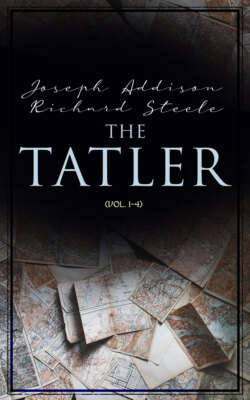Читать книгу The Tatler (Vol. 1-4) - Joseph Addison - Страница 132
На сайте Литреса книга снята с продажи.
St. James's Coffee-house, June 22.
ОглавлениеLast night arrived two mails from Holland, which brings letters from the Hague of the 28th instant, N.S., with advice, that the enemy lay encamped behind a strong retrenchment, with the marsh of Remières on their right and left, extending itself as far as Bethune: La Bassée is in their front, Lens in their rear, and their camp is strengthened by another line from Lens to Douay. The Duke of Marlborough caused an exact observation to be made of their ground, and the works by which they were covered, which appeared so strong, that it was not thought proper to attack them in their present posture. However, the Duke thought fit to make a feint as if he designed it; and accordingly marching from the abbey at Looze, as did Prince Eugene from Lampret, advanced with all possible diligence towards the enemy. To favour the appearance of an intended assault, the ways were made, and orders distributed in such a manner, that none in either camp could have thoughts of anything but charging the enemy by break of day the next morning: but soon after the fall of the night of the 26th, the whole army faced towards Tournay, which place they invested early in the morning of the 27th. The Marshal Villars was so confident that we designed to attack him, that he had drawn great part of the garrison of the place, which is now invested, into the field: for which reason, it is presumed it must submit within a small time; which the enemy cannot prevent, but by coming out of their present camp, and hazarding a general engagement. These advices add, that the garrison of Mons had marched out under the command of Marshal d'Arco; which, with the Bavarians, Walloons, and the troops of Cologne, have joined the grand army of the enemy.
327. John Norris (1657–1711), the divine, published, in 1688, "The Theory and Regulation of Love, a Moral Essay; to which are added Letters Philosophical and Moral between the author and Doctor Henry More."
328. Henry More, the platonist (1614–87), published "Divine Dialogues," "Conjectura Cabalistica," and many other works.
329. It is not clear why Milton is bracketed with Norris and More; perhaps Swift had in mind such passages about heavenly love as that in "Paradise Lost," viii. 588–614.
330. Swift seems to have been the author of this first portion of No. 32, which contains a scandalous attack on Mary Astell. Nichols thought that Addison also had a share in it. See Nos. 59, 63. Mrs. Astell, a friend of Lady Elizabeth Hastings and John Norris, published, in 1694, her "Serious Proposal to the Ladies," advocating a Church of England monastery, without any irrevocable vows. Provision was made for mental as well as moral training; in fact, the institution was to have been "rather academical than monastic." But Bishop Burnet advised Lady Elizabeth Hastings not to subscribe to the proposed building, and the scheme fell through. In 1709, Miss Astell published a book called "Bart'lemy Fair; or, An Enquiry after Wit. … By Mr. Wotton, in answer to Lord Shaftesbury's Letter concerning Enthusiasm, and other profane writers." In the advertisement to the Second Edition ("An Enquiry after Wit," &c., 1722), Mary Astell says that, although her book was at first published under a borrowed name, it was ascribed to her, and drew upon her the resentment of that sort of men of wit who were exposed, and was the true cause of the fable published in the Tatler a little after the "Enquiry" appeared. But she notes that, although the Tatler showed its teeth against the "Proposal to the Ladies," the compilator made amends to the author (if not to the bookseller), by transcribing above a hundred pages into his Ladies' Library verbatim, except in a few places, which would not be found to be improved. The "Enquiry after Wit" is dedicated "To the most Illustrious Society of the Kit-Cats," with many sarcastic allusions to their luxury, oaths, &c. True, their names had not been heard of from Hochsted or Ramillies, but then their heroism found in every place an ample theatre for their merits. "The Bath, the Wells, and every Fair, each Chocolate, Gaming House and Tavern resounds with your noble exploits."
331. This is borrowed from Sir Thomas Browne's "Religio Medici," part ii. sect. 9.
332. "Second," in original editions.
333. There is an apology for punning in No. 36 of the Guardian.
334. Swift.
